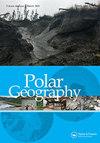Asian states at the Arctic Council: perceptions in Western States
IF 1.6
Q3 GEOGRAPHY, PHYSICAL
引用次数: 12
Abstract
ABSTRACT The upheavals caused by climate change in the Arctic region have contributed to its return to the geopolitical scene, leading to dramatic scenarios, such as the possibility of a new ‘perceived Cold War’, to the appropriation of Arctic resources, or the creation of ‘Arctic sea highways’ as objects of intense rivalries. If the Arctic States, including Russia, have actually operated in recent years a partial reorientation of their military and economic programs to the Arctic, it is nevertheless the growing interest of Asian States in this region that further drew the attention of western media and researchers in recent years. Indeed, many western media reflect concerns about the interest of Asian States for the Arctic and for the Arctic Council, and the possible loss of influence of the Arctic indigenous communities and States in the Arctic Council. Interrogations about the intentions of these new observers, India, Japan, South Korea and China (in particular), have fed concerns about their possible domination of the agenda of the Council. What is the attitude of these observers at the Arctic Council and are these concerns warranted?亚洲国家在北极理事会:西方国家的看法
北极地区气候变化引起的动荡促使其重返地缘政治舞台,导致戏剧性的情景,如可能发生新的“感知冷战”,北极资源的占用,或创建“北极海上高速公路”作为激烈竞争的对象。如果说包括俄罗斯在内的北极国家近年来确实将其军事和经济计划部分转向了北极,那么近年来,亚洲国家对该地区日益增长的兴趣进一步引起了西方媒体和研究人员的注意。事实上,许多西方媒体反映出对亚洲国家对北极和北极理事会的利益以及北极土著社区和国家在北极理事会中可能失去影响力的关切。对这些新观察员,特别是印度、日本、南朝鲜和中国的意图的质疑,使人们担心它们可能支配安理会的议程。这些观察员在北极理事会的态度是什么?这些担忧是否合理?
本文章由计算机程序翻译,如有差异,请以英文原文为准。
求助全文
约1分钟内获得全文
求助全文
来源期刊

Polar Geography
GEOGRAPHY, PHYSICAL-
CiteScore
5.30
自引率
0.00%
发文量
13
期刊介绍:
Polar Geographyis a quarterly publication that offers a venue for scholarly research on the physical and human aspects of the Polar Regions. The journal seeks to address the component interplay of the natural systems, the complex historical, political, economic, cultural, diplomatic, and security issues, and the interchange amongst them. As such, the journal welcomes comparative approaches, critical scholarship, and alternative and disparate perspectives from around the globe. The journal offers scientists a venue for publishing longer papers such as might result from distillation of a thesis, or review papers that place in global context results from coordinated national and international efforts currently underway in both Polar Regions.
 求助内容:
求助内容: 应助结果提醒方式:
应助结果提醒方式:


